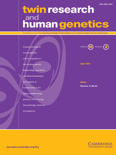
AMERICAN JOURNAL OF HUMAN BIOLOGY
Scope & Guideline
Uncovering the Intersections of Anatomy and Evolution
Introduction
Aims and Scopes
- Human Biological Variation:
The journal explores the genetic, environmental, and cultural factors that contribute to human biological diversity, including studies on phenotypic traits, genetic polymorphisms, and their implications for health. - Anthropological Perspectives on Health:
Research published in the journal often incorporates anthropological frameworks to understand health behaviors, reproductive health, and the impacts of socio-economic factors on health outcomes. - Public Health and Epidemiology:
The journal addresses public health issues through the lens of human biology, focusing on epidemiological studies that investigate the relationship between biological factors and health outcomes. - Developmental and Nutritional Studies:
A significant focus is placed on the developmental aspects of human biology, examining the effects of nutrition, growth patterns, and early life environments on long-term health. - Biocultural Approaches:
The journal promotes biocultural perspectives that integrate biological and cultural factors influencing health, emphasizing the importance of context in understanding human biology.
Trending and Emerging
- Impact of Climate Change on Human Health:
Research is increasingly focusing on how climate change affects human health, including studies on nutrition, adaptive responses, and the implications for vulnerable populations. - Mental Health and Wellbeing:
There is a growing emphasis on the interconnections between mental health, social support, and physiological responses, particularly in the context of stress and trauma. - Minimally Invasive Biomarkers:
The use of minimally invasive techniques for biomarker collection is on the rise, with research exploring their applications in assessing health and disease in diverse populations. - Socioeconomic Determinants of Health:
Emerging studies increasingly examine how socioeconomic factors influence health outcomes, particularly in marginalized communities and during crises like the COVID-19 pandemic. - Biocultural Research Methodologies:
Innovative biocultural research methodologies are trending, as researchers explore the interplay between biological and cultural factors in shaping health outcomes.
Declining or Waning
- Historical and Archaeological Studies:
While still relevant, there has been a noticeable decrease in publications focused on historical human biology and archaeological findings, as contemporary biological research takes precedence. - Purely Genetic Studies:
Research that solely emphasizes genetic factors without considering environmental or cultural contexts seems to be less frequent, indicating a shift towards more integrative approaches. - Single-Factor Health Studies:
There is a decline in studies that analyze health outcomes based on a single variable, such as BMI or specific biomarkers, as the journal increasingly favors multifactorial analyses. - Traditional Anthropometry:
The reliance on traditional anthropometric methods without incorporating advanced technological approaches or biostatistical methods has decreased, as the field moves towards more innovative assessment techniques.
Similar Journals

Current Hypertension Reviews
Transforming Hypertension Research into PracticeCurrent Hypertension Reviews, published by Bentham Science Publishers Ltd, stands as a leading journal in the field of internal medicine, particularly focusing on hypertension and related cardiovascular disorders. With an impressive impact factor and ranked #59 out of 167 in the Scopus medicine category, this journal highlights key insights and contemporary research trends from its inception in 2006 to 2024. Its commitment to making high-quality research accessible to the medical community, despite lacking an Open Access option, ensures that it continues to contribute significantly to the scientific discourse surrounding hypertension management and innovative treatments. Researchers, clinicians, and students alike will find valuable resources within its pages, as Current Hypertension Reviews plays a critical role in advancing the understanding and treatment of hypertension, ultimately supporting better health outcomes globally.

DEVELOPMENTAL PSYCHOBIOLOGY
Illuminating the Interplay of Mind and MatterDEVELOPMENTAL PSYCHOBIOLOGY, published by Wiley, stands at the forefront of interdisciplinary research at the intersection of psychology, neuroscience, and biology. Established in 1968, this esteemed journal serves as a vital platform for scholars and practitioners, disseminating key findings that explore the intricate relationships between developmental processes and biological mechanisms. With an impressive impact factor and categorized in the Q2 quartile across multiple disciplines—including Behavioral Neuroscience and Developmental Psychology—this journal actively contributes to advancing knowledge and fostering dialogue among researchers in the field. Though not open access, DEVELOPMENTAL PSYCHOBIOLOGY remains accessible through institutional subscriptions, ensuring that significant contributions to the understanding of developmental dynamics are available to a broad audience. By providing high-quality, peer-reviewed articles, the journal aims to highlight innovative methodologies and theoretical advances that influence both basic science and applied practices, making it an invaluable resource for researchers, professionals, and students alike.

AMERICAN JOURNAL OF PHYSICAL ANTHROPOLOGY
Bridging Disciplines in the Study of HumanityAMERICAN JOURNAL OF PHYSICAL ANTHROPOLOGY, published by Wiley, has established itself as a leading platform in the field of physical anthropology since its inception in 1918. This esteemed journal, identifiable by its ISSN 0002-9483 and E-ISSN 1096-8644, has been instrumental in disseminating groundbreaking research, achieving impressive rankings in both Social Sciences (Rank #18/443, 96th percentile) and Medicine (Rank #9/44, 80th percentile) categories within Scopus. Although its coverage in Scopus has concluded as of 2021, the journal continues to be a vital resource for academics and professionals seeking to explore the biological aspects of human evolution and variation. With a commitment to high-quality, peer-reviewed publications, the journal supports open access to enhance the visibility and accessibility of anthropological research globally. Researchers, students, and professionals are encouraged to engage with the innovative findings published in this journal, contributing to the ongoing dialogue in physical anthropology.

Nature Human Behaviour
Exploring the intricacies of human interaction.Nature Human Behaviour, published by Nature Portfolio in the United Kingdom, stands at the forefront of interdisciplinary research, connecting the fields of Behavioral Neuroscience, Experimental and Cognitive Psychology, and Social Psychology. With its commitment to publishing groundbreaking studies, this prestigious journal is categorized within the Q1 quartiles for 2023, indicating its elite status and significant influence in the academic community. Recognized globally with a remarkable Scopus ranking of #1 in multiple psychology and neuroscience categories, it showcases the highest quality research, thus appealing to students, professionals, and researchers alike. Despite being a subscription-based journal, its impactful scientific discourse continues to shape understanding of human behavior in social contexts. With the ambition to elucidate the complexities of human interaction and cognition, Nature Human Behaviour serves as an essential resource for anyone dedicated to advancing the realm of human behavioral sciences.

HOMO-JOURNAL OF COMPARATIVE HUMAN BIOLOGY
Unveiling Insights into Human DiversityHOMO - Journal of Comparative Human Biology is a prestigious academic journal dedicated to advancing the field of comparative human biology, offering a platform for researchers, professionals, and students to disseminate cutting-edge findings. Published by E Schweizerbart'sche Verlagsbuchhandlung in Germany, this journal has been a crucial resource since its inception in 1950, featuring a rich archive of studies until 2023. It holds a Q3 quartile ranking in Anthropology and a Q4 quartile ranking in Miscellaneous Medicine, reflecting its significance and influence within the academic community. Although not an Open Access journal, it provides a wealth of robust research that intersects with various disciplines within the anthropological sciences. Researchers looking for a wide array of comparative studies and insights into human biology will find HOMO an invaluable addition to their scholarly resources.

Biodemography and Social Biology
Connecting Biological and Social Sciences for a Deeper UnderstandingBiodemography and Social Biology is a distinguished academic journal published by Routledge Journals, Taylor & Francis Ltd, focusing on the intersections of demographic and biological sciences. With its ISSN 1948-5565 and E-ISSN 1948-5573, this journal contributes significantly to the fields of anthropology, demography, and social biology, making it an essential resource for researchers and professionals alike. The journal has consistently achieved high rankings, notably placing in Q2 in both anthropology and demography, underlining its impact in these critical areas of study. Although it does not provide Open Access options, the journal's rigorous peer-review process ensures the highest quality of academic discourse and research dissemination. Covering a wide scope of topics related to human population dynamics, health, and behavior, Biodemography and Social Biology serves as a vital platform for advancing knowledge and understanding of the biological and social factors influencing human societies since its inception in 1990. Researchers, students, and professionals are invited to contribute their findings and insights, enriching the academic conversation that this journal fosters.

Twin Research and Human Genetics
Championing Open Access to Twin Research and Genetic AdvancesTwin Research and Human Genetics, published by Cambridge University Press, is a leading academic journal that focuses on the vital intersections of genetics, human development, and twin studies. With an ISSN of 1832-4274 and E-ISSN 1839-2628, this journal serves as a critical resource for researchers, healthcare professionals, and students interested in advancing their understanding of genetic influences on human health and behavior. In its dedication to disseminating high-quality research, Twin Research and Human Genetics holds impressive category quartile rankings, including Q2 in Pediatrics, Perinatology, and Child Health, and Q3 in both Genetics (Clinical) and Obstetrics and Gynecology as of 2023. The journal has a converged publication timeline from 2005 to 2024, providing a longstanding platform for rigorous scientific inquiry and discussion in its specialized fields. As an open-access title, it fosters accessibility to vital findings and promotes collaboration among scholars worldwide, ensuring that groundbreaking research reaches a broader audience. Positioned within a challenging and competitive landscape, this journal stands out for its commitment to excellence and its pivotal role in shaping the future of genetic research and its implications for health across the lifespan.

ANNALS OF HUMAN BIOLOGY
Fostering Interdisciplinary Insights into Human BiologyANNALS OF HUMAN BIOLOGY is a distinguished academic journal published by Taylor & Francis Ltd that focuses on the intersection of human biology and health sciences. With an ISSN of 0301-4460 and an E-ISSN of 1464-5033, this journal has been a pivotal resource for researchers and practitioners since its inception in 1974. Covering critical domains such as Aging, Epidemiology, Genetics, Physiology, and Public Health, it exemplifies an interdisciplinary approach that enhances our understanding of human biological variation and its implications for health and disease. While it currently does not offer Open Access, the journal maintains a respectable standing in its field with notable rankings in Scopus, reflecting its contributions to scientific knowledge. Its commitment to high-quality research and comprehensive review makes it an essential platform for scholars, healthcare professionals, and students seeking to explore the biological underpinnings of human health.

Advances in Human Biology
Unlocking Insights into Human Biological ProcessesAdvances in Human Biology is a premier open-access journal published by Wolters Kluwer Medknow Publications, dedicated to disseminating innovative research and insights in the rapidly evolving field of human biology. With an ISSN of 2321-8568 and an E-ISSN of 2348-4691, this journal aims to provide a platform for researchers, professionals, and students to explore human biological processes, their implications for health and disease, and the latest advancements in biological technologies. Since adopting an open-access model in 2016, Advances in Human Biology has committed itself to increasing the accessibility of crucial scientific knowledge, enabling a wider reach and impact within the global academic community. Located in Mumbai, India, the journal is managed by Wolters Kluwer India Pvt Ltd, a respected name in scholarly publishing, ensuring high-quality content and rigorous peer review. Researchers contributing to this journal engage in a diverse range of topics, fostering interdisciplinary collaboration that is essential for addressing contemporary challenges in human biology.

Economics & Human Biology
Transforming Health Outcomes through Economic UnderstandingEconomics & Human Biology, published by Elsevier, is a prestigious journal that serves as an interdisciplinary platform at the intersection of economics and health sciences. With ISSN 1570-677X and E-ISSN 1873-6130, this journal analyzes the implications of economic factors on human health and biological outcomes. As a recognized leader in its field, it has earned a remarkable Q1 ranking in both the Economics, Econometrics and Finance (miscellaneous) and Health (social science) categories for 2023, reflecting its significant impact within the academic community, as evidenced by its Scopus rank of 88 out of 371 and a 76th percentile ranking in Health social sciences. Highlighting key issues such as health disparities, economic policy impacts on health, and the biological determinants of economic behavior, the journal encourages innovative research that bridges these critical domains. Researchers, professionals, and students seeking to contribute to or stay informed on emerging trends in health economics will find this journal an invaluable resource. Explore the latest findings and engage with a community dedicated to advancing our understanding of the interplay between economics and human biology.